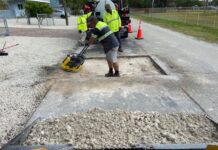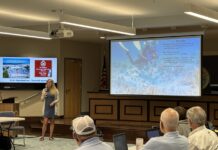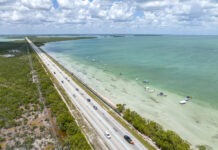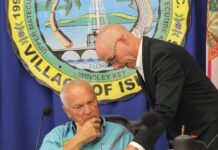Islamorada Village Council adopted a tentative millage rate of 3.000 via a 3-1 vote during a special budget hearing on Sept. 8 at Founders Park Community Center. That millage number could change, however, if two council members dissent during final budget adoption on Monday, Sept. 19.
With a millage rate of 3.000, the village would collect just over $14.6 million in ad valorem taxes for its general fund expenses during the 2022-23 fiscal year, which begins Oct. 1. The 2021-22 adopted budget saw the village gathering $12.5 million in ad valorem taxes with a millage rate of 3.000. Taxable value in 2021-22 totaled $4.2 billion. That number rose to nearly $5.1 billion this year.
With fuel and labor costs rising, the proposed operating budget for the village is roughly 6.3% higher than last year’s total operating expenses. Total expenditures for the coming fiscal year is roughly $17.8 million.
Village Manager Ted Yates said village employees account for roughly 70% of general fund expenses. Public safety accounts for $8.6 million, followed by general government at $5.8 million.
The budget includes a 5% to 6% raise for all staff. Councilman David Webb advocated that number be raised to 6% to 7%.
“Everything we do is based on people we employ and pay to provide service to residents,” Yates said.
While Yates told council he was comfortable with a 3.000 mills rate, he said the council had a choice between that and the rolled back rate of 2.7649. It’s the difference between putting $589,000 into reserves or using $1.6 million in reserves to balance the budget. Yates said the village spent $10.3 million to clean up and come back from a powerful Hurricane Irma in 2017. Current budget projections show the village holding roughly $12.1 million in its reserves.
“I haven’t lived through a hurricane yet. I can only imagine what stresses the village went under,” he said. “Being financially healthy and sound doesn’t happen year to year. It’s planned and protected on a year-to-year basis.”
Through the Save our Homes amendment, annual increases in assessed value of homesteaded properties are limited to 3%. Roughly 35% of properties are homesteaded in Islamorada.
Councilman Mark Gregg said he’s an advocate for a larger reserve to prepare for a hurricane. Gregg said the end of building rights in 2023 is another issue facing the village.
“We can’t predict it. We don’t know when it’s going to hit. It may hit over a long period of time,” Gregg said regarding the fallout of building permits no longer being issued in 2023. “That’s something we really need to start to plan for and think about seriously.“
Webb, who threw his support behind the 3.000 mills, said the council has an option of providing salary and benefit increases for employees all while throwing close to $600,000 into reserves. Or, the council could begin a process of deficit spending if they revert to the roll back and use $1.6 million in reserves.
“We have two clear choices. We can either make financially-sound decisions for this community going forward, because someone mentioned the end of BPAS next year,” he said. “We haven’t retained any land-use attorneys, we haven’t committed any expert witnesses, we haven’t put any structure whatsoever to deal with what’s coming next year.
“Yes, it will probably take years for the final chapter to be written on it, but we’re going to be spending money on the community on behalf of our residents every single day of those years, trying to reduce the liability that they have for the state’s decision to curb growth here. That’s reality,” he continued.
Councilman Buddy Pinder voted against the proposed millage rate of 3.000.
“I know what you’re saying and I’m a strong believer we should have some reserves and stay healthy. At the same time, I think about what this county went through with COVID and I think about how gasoline prices have all gone up. The residents and the businesses of our community have had to bear that burden,” he said.
Mayor Pete Bacheler, who appeared at the budget meeting via Zoom, said he’s not in favor of deficit spending.
“We are charged with making very important decisions to the best of our ability, correctly. Anything that takes us to deficit spending is incorrect and the wrong way to go.”
Bacheler told the Keys Weekly that he believes there’s an opportunity to bring down the millage rate a bit. He said he will present his proposal to the village council.
Vice Mayor Henry Rosenthal, who’s been in the hospital, was absent from the meeting.
A two-thirds vote is needed to pass a budget with a proposed 3.000 mills. Otherwise the millage rate will fall below the proposed figure.























